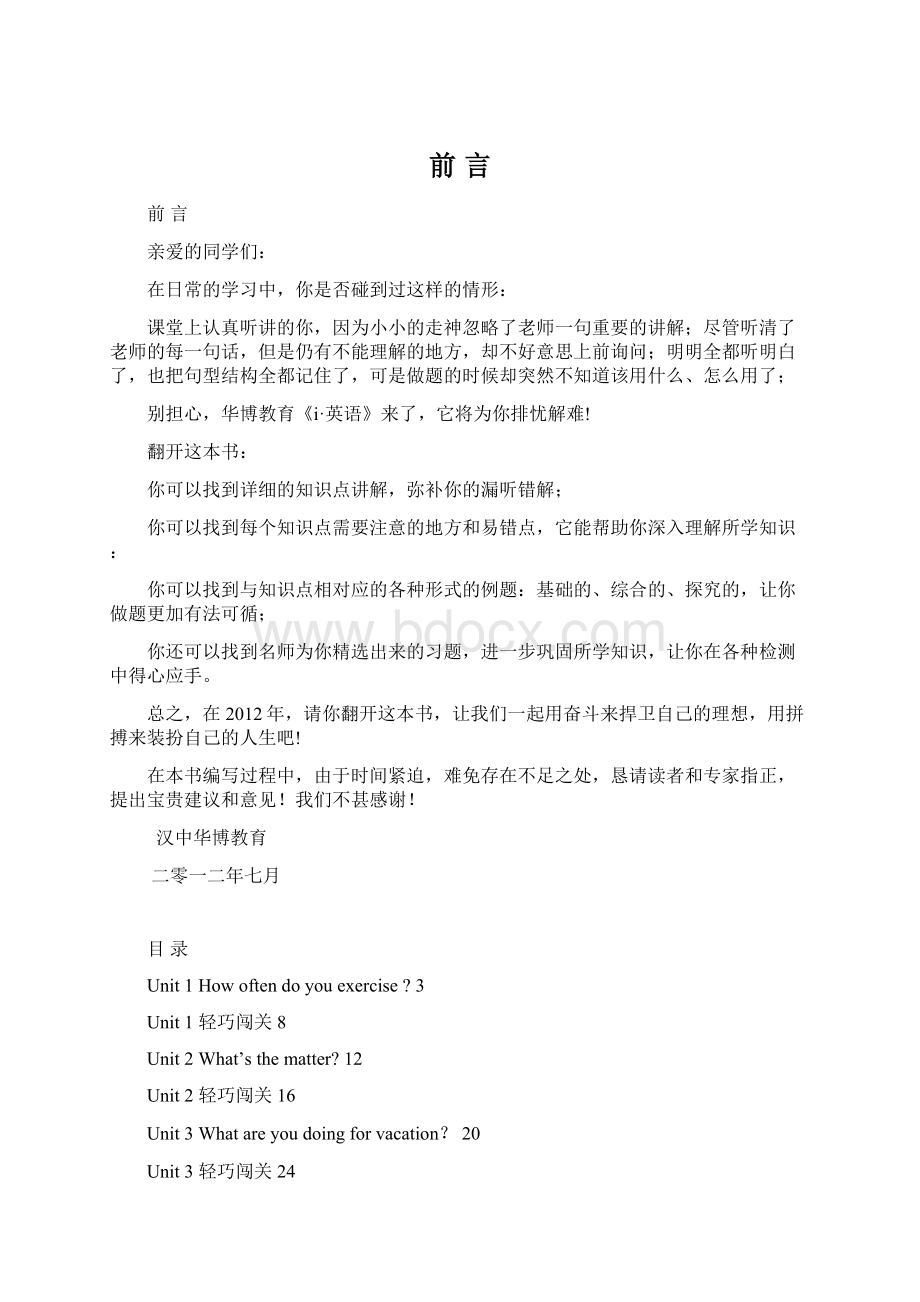前 言.docx
《前 言.docx》由会员分享,可在线阅读,更多相关《前 言.docx(100页珍藏版)》请在冰豆网上搜索。

前言
前言
亲爱的同学们:
在日常的学习中,你是否碰到过这样的情形:
课堂上认真听讲的你,因为小小的走神忽略了老师一句重要的讲解;尽管听清了老师的每一句话,但是仍有不能理解的地方,却不好意思上前询问;明明全都听明白了,也把句型结构全都记住了,可是做题的时候却突然不知道该用什么、怎么用了;
别担心,华博教育《i·英语》来了,它将为你排忧解难!
翻开这本书:
你可以找到详细的知识点讲解,弥补你的漏听错解;
你可以找到每个知识点需要注意的地方和易错点,它能帮助你深入理解所学知识:
你可以找到与知识点相对应的各种形式的例题:
基础的、综合的、探究的,让你做题更加有法可循;
你还可以找到名师为你精选出来的习题,进一步巩固所学知识,让你在各种检测中得心应手。
总之,在2012年,请你翻开这本书,让我们一起用奋斗来捍卫自己的理想,用拼搏来装扮自己的人生吧!
在本书编写过程中,由于时间紧迫,难免存在不足之处,恳请读者和专家指正,提出宝贵建议和意见!
我们不甚感谢!
汉中华博教育
二零一二年七月
目录
Unit1Howoftendoyouexercise?
3
Unit1轻巧闯关8
Unit2What’sthematter?
12
Unit2轻巧闯关16
Unit3Whatareyoudoingforvacation?
20
Unit3轻巧闯关24
Unit4Howdoyougettoschool?
28
Unit4轻巧闯关31
Unit5Canyoucometomyparty?
34
Unit5轻巧闯关37
Unit6I|’mmoreoutgoingthanmysister.41
Unit6轻巧闯关45
Unit7Howdoyoumakeabananamilkshake?
48
Unit7轻巧闯关52
Unit8Howwasyourschooltrip?
56
Unit8轻巧闯关60
Unit9Whenwasheborn?
64
Unit9轻巧闯关69
Unit10I′mgoingtobeabasketballplayer.73
Unit10轻巧闯关77
Unit11Couldyoupleasecleanyourroom?
81
Unit11轻巧闯关86
Unit12What′sthebestradiostation?
90
Unit12轻巧闯关94
Unit1Howoftendoyouexercise?
Ⅰ.Keywordsandexpressions.
1.exercise[′eksəsaiz]v.&n.锻炼,运动;练习。
当运动讲时为不可数名词。
eg:
Wedomorningexerciseeveryday.
当练习讲时为可数名词,有单复数之分。
eg:
Let’sdoexercises.
2.skateboard[′skeitbɔ:
d]v.踩滑板,参加滑板运动
短语:
goskateboarding滑滑板
eg:
Let’sgoskateboardingonthisSunday.
3.hardly[′ha:
dli]adv.几乎不,几乎没有=seldom
hard[ha:
d]adj.①硬的,坚固的②困难的;③猛烈的;④严厉的;
adv.①努力地;②牢固地③艰苦地,猛烈地
eg:
Ihardlyeatjunkfood.Theworkissohard.
4.time[taim]n.时间,次数
当时间讲时为不可数名词,当为次数讲时为可数名词:
短语:
oncetimethreetimes
eg.:
Pleasetakethismedicinethreetimesaday.
5.highschool=seniorhighschool高中
primaryschool小学middleschool初中university大学
6.active[′æktiv]adj.活跃的,积极的
act[ækt]vi.①行动,做事:
②扮演,充当n.①行为,行动②法令,条令
actively[′æktivli]adv.积极地,活跃地action[′ækʃn]n.①行为,行动②诉讼
eg:
Weshouldbeactiveinclass.
7.chocolate[‵tʃɔklit]n.巧克力(不可数名词)若想表达一块巧克力为:
apieceofchocolate
fourpiecesofchocolate四块巧克力
eg:
Hehasmuchchocolateinhisbag.
8.health[helθ]n.健康,卫生healthy[′helθi]adj.健康的,卫生的
Healthily[′helθili]adv.健康地unhealthy[ʌn′helθi]adj.不健康的
eg:
Iamprettyhealthy.
9.different[′difərənt]adj.不同的;有区别的短语:
bedifferentfrom与…不同的
eg:
Herclothesaredifferentfrommine.
10.same[seim]adj.相同的短语:
…bethesameas…
eg:
HisbagisthesameasLily’s.
Ⅱ.Keyphrases.
1.howoften多久一次2.junkfood垃圾食品
3.alotof=lotsof许多大量4.lookafter=takecareof照顾5.eatinghabit饮食习惯6.ofcourse当然,自然
7.howmany+可数名词复数多少8.threetimesaweek一周三次
9.bedifferentfrom和…不同10.thesame...as和…一样
11.begoodfor对…有益12.gotothemovies去看电影
13.trytodosth.尽力/试图做某事tryone’sbesttodosth.尽某人最大能力做某事
14.asfor关于,至于
Ⅲ.Keystructure.
1.Whatdoyouusuallydoonweekends?
Iusuallyplaysoccer.
Whatdotheydoonweekends?
Theyoftengotothelibrary.
Whatdoeshedoonweekends?
Hesometimesreadsbooks.
2.Howoftendoyoueatvegetables?
Ieatvegetableseveryday.
HowoftendoesLilywatchTV?
ShewatchesTVtwiceaweek.
3.Howmanyhoursdoyousleepeverynight?
Isleepninehourseverynight.
Ⅳ.Grammarfocus.
一.一般现在时
1.构成
一般现在时的谓语动词主要用动词原形表示,但如果主语是第三人称单数,则谓语动词也要变为第三人称单数形式。
另外,be动词和have有特殊的人称形式。
2.一般现在时的用法
(1)表示经常发生的动作或存在的状态。
常和always,often,sometimes,everyday,everyweek等时间状语连用。
例如;
Heisoftenlateformeeting.他常常开会迟到。
(2)表示客观真理。
由于是众所周知的客观事实,所以一般不用时间状语。
例如:
Theearthmovesaroundthesun.地球绕着太阳转。
(3)有些表示心理状态和感觉的动词往往用于一般现在时中。
例如:
Iwanttoseeyou.我想去看你。
(4)句式的变化
①含be(此处指am,is,are)动词
一般现在时的肯定结构:
主语+be+其他eg:
Sheisastudent.
一般现在时的否定结构:
主语+benot+其他eg:
Tomisn’tathome.
一般现在时的疑问句结构:
Be+主语+其他+问号eg:
Isyourbrotheraworker?
②含行为动词:
(实意动词)动词原形
一般现在时的肯定结构:
主语++其他
动词的第三人称单数形式
a.当主语不是第三人称单数时,其后的谓语要用动词原形表示。
eg:
Iusuallyplaysoccer.
b.当主语是第三人称单数时,其后的谓语要用动词的第三人称单数表示。
eg:
Shesometimesplaystennis.
don’t+动词原形
一般现在时的否定结构:
主语++其他
doesn't+动词原形
a.当主语不是第三人称单数时,其后的谓语要用don’t加动词原形。
eg:
Idon’toftenplaybaseball.
b.当主语是第三人称单数时,其后的谓语要用doesn’t加动词原形。
eg:
Shedoesn’tusuallyeatfriedchicken.
一般现在时的疑问结构:
Do/Does+动词原形+其他+问号
a.当主语不是第三人称单数时,疑问句要用Do来提问。
eg:
DotheysometimeswatchTV?
b.当主语是第三人称单数时,疑问句要用Does来提问。
eg:
Doesyourmotherusuallycookathome?
二.由how构成的特殊疑问词的用法
(1)howoften通常用来询问动作发生的频率,答语一般用once“一次”,twice“两次”,threetimesaday“一天三次”,sometimes“有时”,never“从不”,veryoften“经常”等。
(2)howlong主要用来提问时间的长短,答语是一段时间,如:
tooweeks/months/years等,也可以用来询问物体的长度。
(3)howmuch用来提问不可数名词数量的多少或对价格提问。
(4)howmany对可数名词数量提问,后面直接加可数名词复数形式。
eg:
-Howlonghaveyouworkedhere?
-Twentyyears.
3.介词in,on,at的用法区别(表时间)
在英语中泛指早上、下午、晚上时用inthemorning/afternoon/evening来表示,而具体到某一天的上午、下午、晚上则用介词on;在某年、某月前要用介词in;在具体某一天要用on,在几点钟前要用介词at;to一般不放在时间前,表示“几点差几分”时,to意为“差”。
例如:
fivetoten意为“差5分10点”.
4.sometimes的用法及其易混词辨析
(1)sometimes的意思是“有时候”,是表示动作发生频率的副词。
(2)sometime通常用来指将来的一个不确定的时间,此时可以与sometime通用。
表示“一段时间”此时不可以与sometime通用。
(3)sometime的意思是“某时,用来表示将来或过去一个不确定的时间。
(4)sometimes表示“次数”,time作次数讲时为可数名词,如threetimes,manytimes.
eg:
HesometimeswatchesTV.
eg:
Wearegoinggohaveapartysometime/sometimenextweek.
eg:
NancywenttoChinasometimes.
5.动词try的用法
(1)trydoingsth.“试着做某事”.例如:
Whynottrydoingtheexperimentinanotherway?
为什么不用另一种方法试试这个实验呢?
(2)try…on“试穿(衣服)”例如:
IwanttotryitonbeforeIbuyit.在购买以前我想试穿一下。
(3)trytodosth=tryone’sbesttodosth意为“尽某人最大努力”,与doone’sbest同义。
例如:
Heistryinghisbestforascholarship(奖学金)。
他在尽最大努力争取奖学金。
6.表达“说”的动词的用法及区别
(1)say强调说的内容,所说的话在句子中常用引号引起来。
(2)talk指“谈论”,后面常接about或者with.
(3)tell意为“告诉”,后面可接不定式,即tellsbtodosth.“让某人做某事”.否定形式为tellsb.nottodosth
(4)speak是不及物动词,后面一般不加宾语。
当作及物动词讲时,后面只能加某一种语言,重点强调说某一种语言。
eg:
MayItoAnn?
A.speakB.sayC.talkD.tell
Ⅴ.Keysentences.
1.Whatdoyouusuallydoonweekends?
Iusuallyplaysoccer.
2.Whatdotheydoonweekends?
Theyoftengotothemovies.
3.Whatdoeshedoonweekends?
HesometimeswatchesTV.
4.Howoftendoyoushop?
Ishoponceamonth.
5.HowoftendoesChengwatchTV.?
HewatchesTVtwiceaweek.
Ⅵ.Dialogue.
A:
Thanksforcominginfortheinterview,Katrina.
B:
That’sOK.ThisisBill.Youcaninterviewhim,too.
A:
OK,then,so,um,howoftendoyouexercise?
B:
Everyday.
C:
Hardlyever.
A:
Uh-huh.Howoftendoyoueatvegetablesandfruit?
B:
IeatvegetableseverydayandIeatfruiteveryday.
C:
Isometimeseatvegetables.ButInevereatfruit.Idon’tlikeit.
A:
Allright.Sohowmanyhoursdoyousleepeverynight?
B:
Nine.Ineedlotsofsleep.
C:
Same.Nice.Ineedlotsofsleep,too.
A:
Howoftendoyoudrinkmilk?
C:
Never.Ican’tstandmilk.It’sawful.
B:
Oh,Ilovemilk—-Idrinkiteveryday.
A:
Whataboutjunkfood?
Howoftendoyoueatit?
C:
Ilovejunkfood—-Ieatitthreeorfourtimesaweek.
B:
Yeah,Iloveit,too.IguessIeatittwoorthreetimesaweek.
A:
Andcoffee?
Howoftendoyoudrinkcoffee?
C:
Oh,Idrinkcoffeefourtimesaday.Ilovecoffee.
B:
Ineverdrinkcoffee.
A:
Well,thankyouverymuch.
B/C:
You’rewelcome.
Ⅶ.Writing.(书面表达)
采访你们班最优秀的同学,写一篇关于其学习及生活习惯的短文。
(词数50左右)
范文:
Rickisthebeststudentinourclass.Hedoeshishomeworkeveryday.HereadsEnglishstorybooksthreetimesaweek.Heexercisestwiceaweek.Heoftenhelpsotherstudents.Heishardlyeverlateforschool.SoRickisthebestoneinourclass.
Unit1轻巧闯关
Ⅰ.选择填空。
()1.-Peter,doyouvisityourgrandparents?
-Twiceamonth.
A.howlongB.howsoonC.howfarD.howoften
()2.Ioftengoto.
A.movieB.amovieC.moviesD.themovies
()3.Istayinbeduntillunchtime.
A.sometimeB.sometimesC.sometimeD.sometimes
()4.KatewillbebackinFebruary.
A.sometimeB.sometimeC.sometimesD.sometimes
()5.“Whatshallwedonext?
”Father.
A.saysB.talksC.tellsD.speaks
()6.Andmyeatinghabitsareprettygood.Itryalotofvegetables.
A.toeatB.eatingC.eatD.eats
()7.-Whichbookdoyouthinkismore,thisoneorthatone?
-Thisone,Ithink.
A.interestB.interestedC.interestingD.beinteresting
()8.There’stimeleft.Let’shurry.
A.alittleB.littleC.afewD.few
()9.Iaboutitwithmyclassmates.
A.speakB.sayC.talkD.tell
()10.HereadsEnglish.
A.everyday;everydayB.everyday;everyday
C.everyday;everydayD.everyday;everyday
()11.-arethesedresses?
-Twentyyuan.
A.HowmuchB.HowmanyC.HowoftenD.Howlong
()12.Theteachertoldthestudentsthattheeartharoundthesun.
A.runB.ranC.runningD.runs
()13.Pleasethemap.
A.lookatB.seeC.watchD.look
()14.Couldyoucomeandwithme?
A.toplayfootballB.playthebasketball
C.playingfootballD.playbasketball
()15.HehasbeentoBeijing.
A.twotimesB.twiceC.onetimesD.threetime
Ⅱ.完形填空。
It’sWednesdayafternoon.Schoolisover,andthestudentsareputtingtheirbooksandpencil-boxes1theirschoolbags.Theteachercomesinandsaystothestudents,“Don’tgo,children.I’vesomethingtotellyou.Listentome.Tomorrowis2.Thereisgoingto3a4meetinginourschool.Themeetingisat9:
00inthemorning.Hereareyourschoolreports(报告)andletters5yourparents.6themhome.Giveyourparentsthelettersand7themyourschoolrepots.Askthem8tothemeeting9timetomorrow,becauseI’mgoingto10somethingaboutnextterm.”
1.A.intoB.offC.onD.out
2.A.TuesdayB.ThursdayC.MondayD.Sunday
3.A.haveB.hasC.beD.is
4.A.students’sB.teacher’sC.parent’sD.parents’
5.A.forB.withC.giveD.and
6.A.TakeB.BringC.PutD.Ca